Overview
Testosterone levels in women generally peak during their early 20s and begin to decline by approximately 1% each year starting in their 30s. This gradual decrease is accompanied by a more pronounced drop during perimenopause. Such hormonal changes can result in various symptoms, including:
- Fatigue
- Weight gain
- Mood fluctuations
Understanding these shifts is crucial for developing effective health and wellness strategies during this transitional phase.
Introduction
Understanding the intricate dance of hormones is crucial for women navigating the various stages of life, particularly as they approach perimenopause. Testosterone levels, which typically peak in a woman’s early 20s, begin a gradual decline that can lead to significant health impacts, including fatigue, weight gain, and mood swings.
As these hormonal shifts unfold, a challenge arises: how can women effectively manage their health and well-being during this pivotal transition?
This article explores the changing landscape of testosterone levels by age in women, offering insights and strategies to empower individuals in maintaining their hormonal balance and overall quality of life.
Understanding Testosterone Levels in Women Across Different Ages
The variations in testosterone levels by age in women are dynamic, exhibiting significant changes throughout different life stages. Typically, testosterone levels by age in women peak in their early 20s and begin a gradual decline thereafter, decreasing by approximately 1% annually starting in the 30s. This decline becomes more pronounced during perimenopause, which generally occurs between the ages of 45 and 55.
During this transitional phase, hormonal changes can trigger a range of symptoms, including:
- Fatigue
- Weight gain
- Mood fluctuations
Specialists emphasize that understanding these hormonal shifts is essential for females, particularly those undergoing significant life transitions. This knowledge can inform their health and wellness strategies, including that align with their unique hormonal profiles.
Testosterone levels by age in women typically vary, generally ranging from 9 to 55 ng/dL. As females age, particularly during and after menopause, the testosterone levels by age in women can decrease significantly, impacting overall wellness and quality of life. Recognizing these changes allows individuals to seek appropriate medical advice and implement lifestyle adjustments, including tailored fitness programs and intelligent nutrition resources offered by Tyde Wellness, to promote hormonal balance and well-being.
At Tyde Wellness, we provide customized, [doctor-prescribed GLP-1 medications](https://www.tydewellness.com/learn/oprah-and-weight-loss-drug-insights-for-perimenopausal-women/), such as Semaglutide and Tirzepatide, which are FDA-approved and designed to support effective weight loss and overall wellness during menopause.
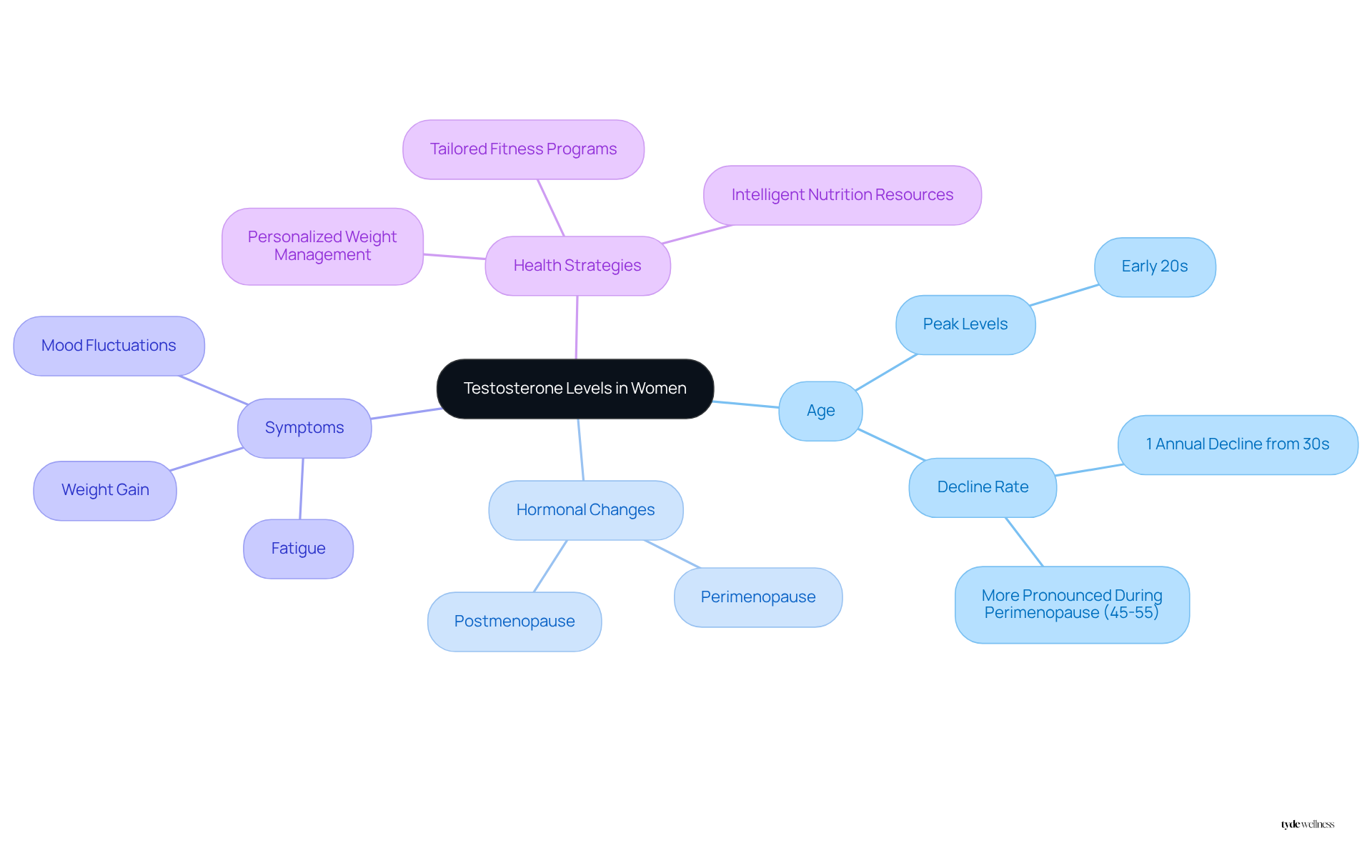
Normal Testosterone Levels by Age: A Detailed Overview for Women
Typical hormone concentrations in females, including testosterone levels by age in women, fluctuate considerably. Females aged 19-49 generally possess hormone concentrations varying from 9-55 ng/dL, and these testosterone levels by age in women reach their highest point during their 20s before slowly decreasing. In individuals between 50-69 years, the testosterone levels by age in women may decrease to 2-41 ng/dL, and after reaching 70, they can decline below 2 ng/dL. These variations emphasize the significance of tracking testosterone levels by age in women, particularly during the transition into menopause. Understanding is crucial, as low testosterone can lead to increased risks of cardiovascular issues and metabolic syndrome.
Identifying imbalances in hormones, including testosterone levels by age in women, enables females to pursue suitable medical guidance if they encounter signs such as weight gain, reduced libido, or mood fluctuations. As a Tyde Circle participant, individuals can access exclusive perks, including wellness program discounts and early access to research and tools. Engaging with their communities allows them to share insights and support one another through these transitions. This community support nurtures a feeling of inclusion and promotes knowledgeable conversations about health and wellness, assisting individuals in managing their changes with confidence.
The generation of testosterone levels by age in women occurs in the ovaries and adrenal glands, further highlighting the need for awareness of these chemical changes.
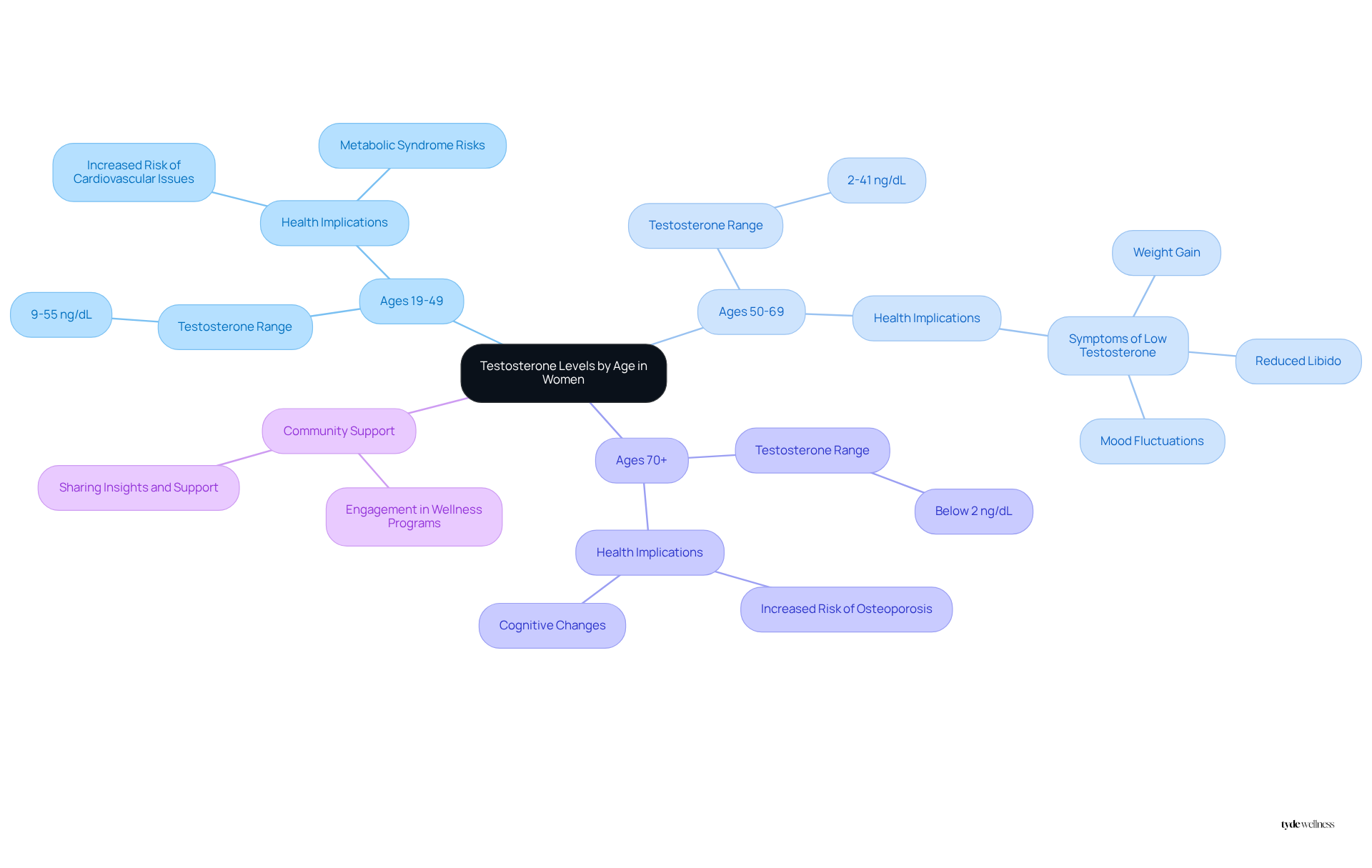
Impacts of Abnormal Testosterone Levels: Symptoms and Treatment Options
Unusual hormone concentrations can result in various symptoms that significantly impact a woman’s quality of life, particularly during pivotal hormonal changes such as perimenopause and menopause. Testosterone levels by age in women typically begin to decline around age 30 or 40, and by menopause, these levels can decrease by nearly 50%. Reduced hormone concentrations may lead to symptoms such as:
- Tiredness
- Diminished sexual desire
- Weight gain
- Mood fluctuations
Conversely, elevated androgen concentrations can manifest as:
- Hirsutism (excessive hair growth)
- Acne
- Irregular menstrual cycles
The typical range for this hormone in women is 15 to 70 ng/dL, making it essential to understand what constitutes abnormal levels. Treatment options for low hormone levels often include:
- Lifestyle changes
- [Hormone replacement therapy](https://webmd.com/women/low-testosterone-in-women)
- Medications that stimulate hormone production
For those experiencing elevated androgen levels, anti-androgen medications and lifestyle modifications can effectively manage symptoms. However, it is crucial to note that there are currently no FDA-approved therapies for females, and taking hormone supplements without medical advice is not recommended. Understanding these effects is vital for women dealing with hormonal fluctuations, as addressing can significantly enhance overall health and quality of life.
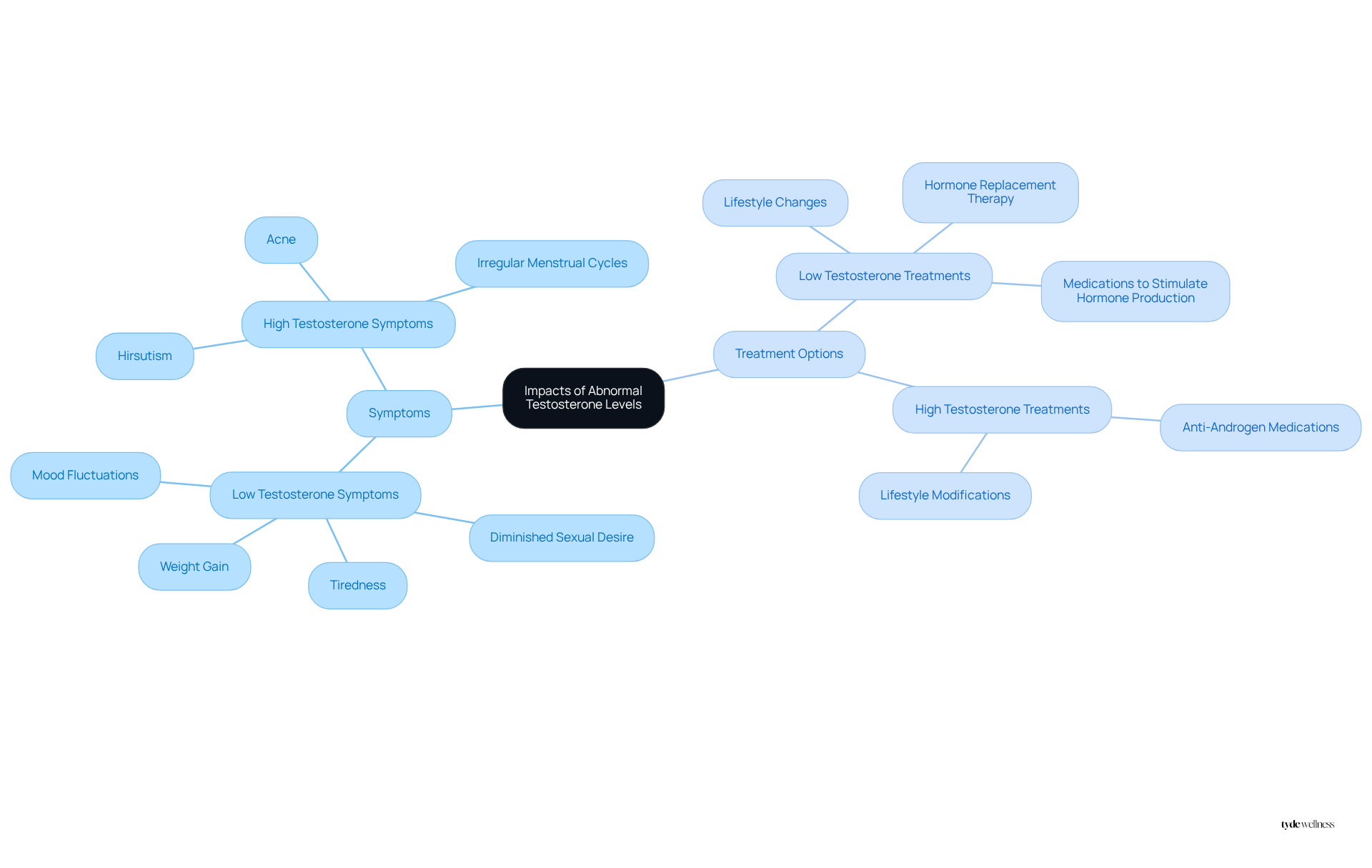
The Role of Lifestyle Factors in Managing Testosterone Levels
Lifestyle factors significantly influence hormone concentrations in females, particularly during perimenopause. Engaging in consistent physical exercise, especially resistance training, has been shown to enhance hormone production and support balance. Research indicates that women who regularly participate in resistance training can experience temporary increases in hormone levels, positively impacting body composition and overall health. Furthermore, a well-rounded diet rich in healthy fats, lean proteins, and whole grains fosters hormonal wellness, with specific nutrients such as protein, magnesium, zinc, B vitamins, and omega-3 fatty acids playing vital roles in hormone production.
[Effective stress management techniques](https://health.harvard.edu/mens-health/lifestyle-strategies-to-help-prevent-natural-age-related-decline-in-testosterone), including mindfulness practices and yoga, are essential, as chronic stress can elevate cortisol levels, negatively affecting hormone production. Studies highlight that women who successfully manage stress through these methods can maintain healthier hormonal balances. Additionally, obtaining sufficient rest—seven to nine hours each night—is crucial for hormone production, as most hormone release occurs during sleep, particularly in the REM phase.
For individuals experiencing hormonal changes, adopting a holistic approach that integrates regular exercise, a [nutritious diet](https://www.tydewellness.com/learn/5-checkpoints-for-when-youre-still-hungry-on-ozempic/), and effective stress management can significantly enhance testosterone levels by age in women, thereby improving overall quality of life. This comprehensive strategy not only addresses but also promotes physical and mental well-being during critical life stages.
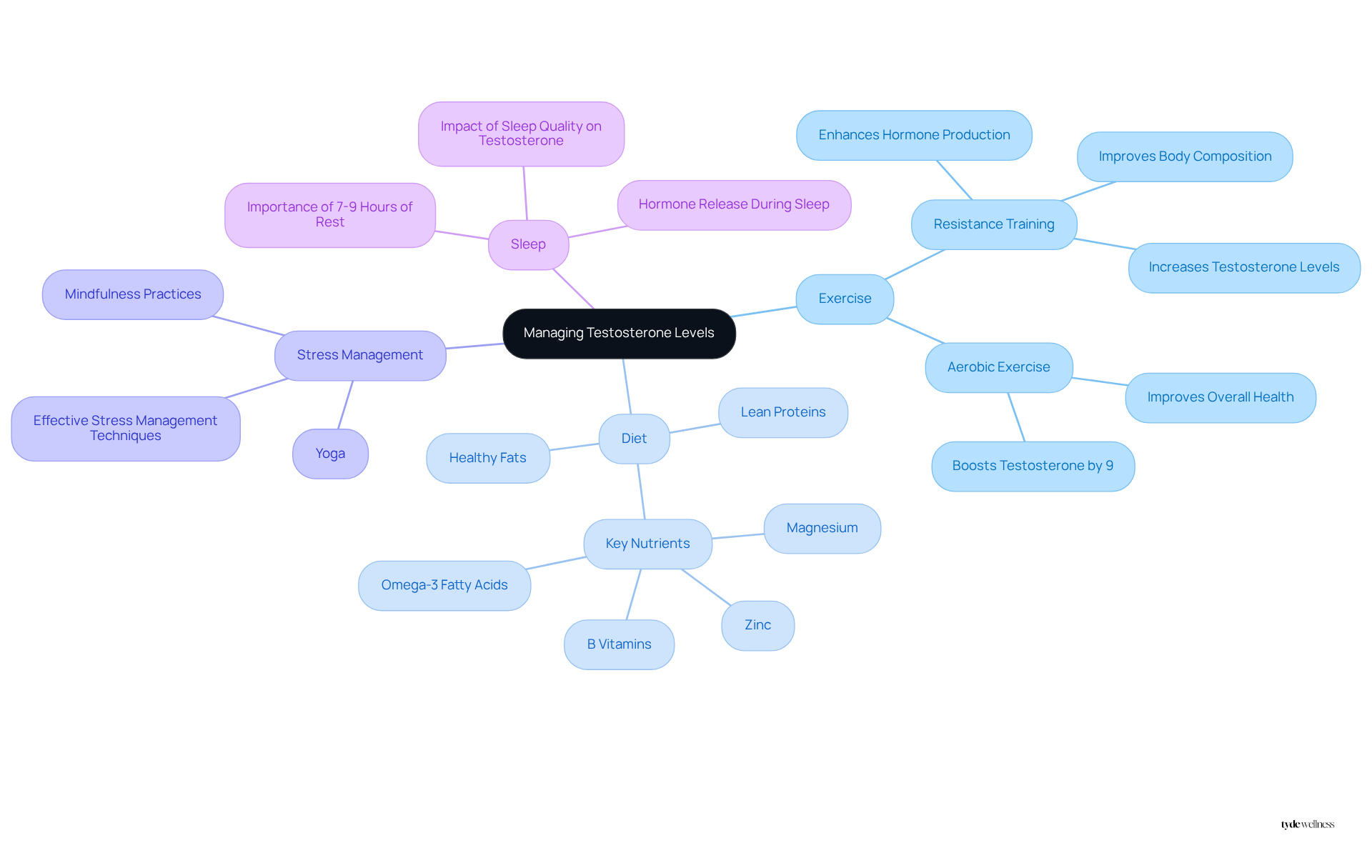
Understanding the Connection Between Testosterone and Weight Management
Testosterone plays a crucial role in managing body composition and metabolism in females. A reduction in hormone levels can lead to increased fat accumulation and decreased muscle mass, complicating weight control, particularly during perimenopause and menopause. Research indicates that women with low hormone levels may experience unexplained weight gain, particularly around the abdomen, along with reduced energy levels, making it more difficult to maintain an active lifestyle. Conversely, optimal hormone levels support muscle preservation and fat reduction, contributing to a healthier body composition.
At Tyde Wellness, we understand that personalized weight management plans, which consider individual biological profiles, are vital for those navigating these transitions. Our tailored nutrition plans, rich in protein and healthy fats, are designed to enhance hormone production and minimize fat storage. We also advocate for strength training to build muscle and elevate metabolism. For instance, Brenda Anderson, a 44-year-old client, reported a significant recovery in energy levels after starting hormone injections, highlighting the potential benefits of addressing hormonal imbalances. Women who engage in not only increase their muscle mass but also enhance their metabolic function, facilitating weight loss.
Understanding the relationship between hormones, particularly testosterone levels by age in women, and body composition empowers individuals to take proactive steps in managing their weight and overall health. Chronic stress and inadequate sleep can lower hormone levels and contribute to weight gain, making it essential to address these factors with targeted strategies. By correcting hormonal imbalances through focused testing and personalized plans, individuals can successfully navigate the challenges of weight management during critical life stages. At Tyde Wellness, we offer a comprehensive support system, including medication delivery directly to your door and an online platform for tracking your progress. As Dr. Debra Karnasiewicz pointed out, while testosterone therapy can be advantageous, the research concerning testosterone levels by age in women is still evolving, underscoring the importance of careful consideration and monitoring. We are here to support you on this journey, ensuring you have the resources and guidance necessary to achieve lasting results.
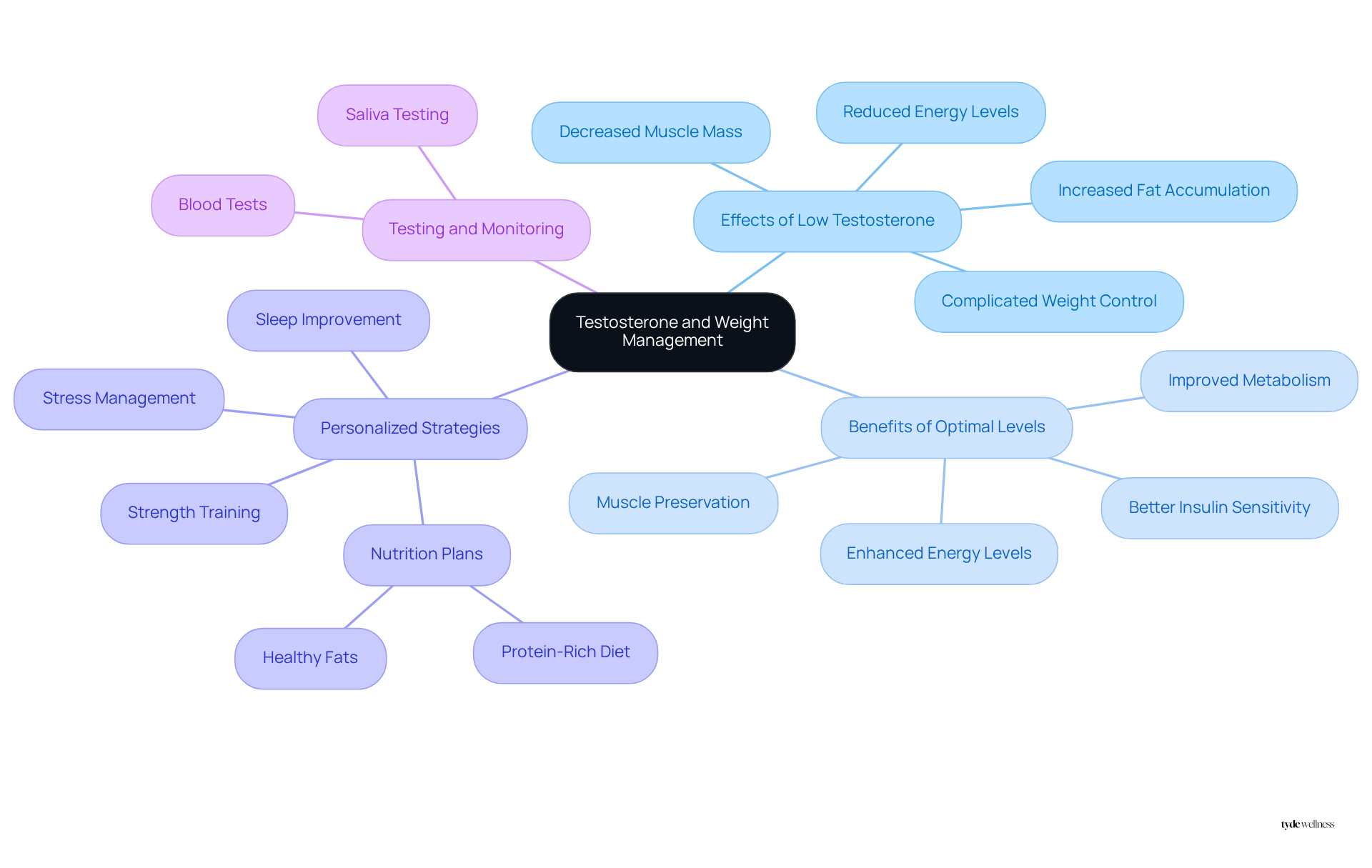
Conclusion
Understanding the fluctuations of testosterone levels by age in women is crucial for navigating the complexities of hormonal health, particularly during significant life transitions such as perimenopause. Testosterone levels typically peak in early adulthood, around the early 20s, and gradually decline with age, experiencing a more pronounced decrease during perimenopause. This decline can result in various symptoms that affect quality of life, making awareness and proactive management essential.
Key insights highlight the importance of recognizing typical testosterone ranges for different age groups and understanding the symptoms associated with both low and high hormone levels. Lifestyle factors, such as exercise, diet, and stress management, play a pivotal role in maintaining hormonal balance. Personalized approaches to weight management and overall wellness, as offered by resources like Tyde Wellness, can significantly enhance health outcomes during these critical phases.
Ultimately, understanding testosterone levels in women across different ages empowers individuals to take informed steps toward better health. By addressing hormonal imbalances through lifestyle changes and seeking appropriate medical guidance, women can improve their overall well-being and quality of life. Embracing a proactive approach not only aids in managing symptoms but also encourages a supportive community where women can share experiences and strategies during their journey.
Frequently Asked Questions
How do testosterone levels in women change with age?
Testosterone levels in women peak in their early 20s and begin to decline gradually by approximately 1% annually starting in the 30s. This decline becomes more pronounced during perimenopause, which typically occurs between the ages of 45 and 55.
What symptoms can occur due to hormonal changes during perimenopause?
Symptoms during perimenopause can include fatigue, weight gain, and mood fluctuations.
What is the normal range of testosterone levels in women by age?
For women aged 19-49, testosterone levels generally range from 9 to 55 ng/dL. In women aged 50-69, levels may decrease to 2-41 ng/dL, and after age 70, levels can fall below 2 ng/dL.
Why is it important to track testosterone levels in women?
Tracking testosterone levels is crucial because low testosterone can increase the risk of cardiovascular issues and metabolic syndrome. Recognizing hormonal imbalances allows women to seek appropriate medical guidance.
What support does Tyde Wellness offer for managing testosterone levels and overall wellness?
Tyde Wellness provides customized, doctor-prescribed GLP-1 medications like Semaglutide and Tirzepatide, which are FDA-approved for effective weight loss and overall wellness during menopause. They also offer wellness program discounts and early access to research and tools for participants.
How can community support benefit women experiencing hormonal changes?
Community support fosters a sense of inclusion and promotes knowledgeable conversations about health and wellness, helping individuals manage their changes with confidence. Engaging with others allows for sharing insights and support throughout these transitions.
List of Sources
- Understanding Testosterone Levels in Women Across Different Ages
- Midlife Women Are Clamoring for Testosterone. Does It Work? (https://nytimes.com/2025/02/04/well/testosterone-therapy-menopause.html)
- What are Normal Testosterone Levels in Women? – Balance My Hormones (https://balancemyhormones.co.uk/what-are-normal-testosterone-levels-for-women)
- Testosterone Levels by Age: What You Need to Know – Alliance Urology (https://allianceurology.com/testosterone-levels-by-age-2)
- As more women turn to testosterone, here’s what to know about the hormone and health risks (https://abcnews.go.com/GMA/Wellness/women-turn-testosterone-hormone-health-risks/story?id=115906820)
- Normal female testosterone levels by age (https://singlecare.com/blog/testosterone-levels-by-age-chart-female)
- Normal Testosterone Levels by Age: A Detailed Overview for Women
- Testosterone and Women – Australasian Menopause Society (https://menopause.org.au/health-info/resources/testosterone-and-women)
- Normal female testosterone levels by age (https://singlecare.com/blog/testosterone-levels-by-age-chart-female)
- Normal Testosterone Levels by Age Chart – Everlywell Blog | At-Home Health & Wellness Insights (https://everlywell.com/blog/testosterone/normal-testosterone-levels-by-age-chart?srsltid=AfmBOorVdFHNgMDCzfebFn6WdmoERq1ZROuKr2AOmfHg4DeP-D5gjX5w)
- Testosterone Levels by Age: Normal Levels for Males and Females (https://healthline.com/health/low-testosterone/testosterone-levels-by-age)
- Impacts of Abnormal Testosterone Levels: Symptoms and Treatment Options
- Midlife Women Are Clamoring for Testosterone. Does It Work? (https://nytimes.com/2025/02/04/well/testosterone-therapy-menopause.html)
- As more women turn to testosterone, here’s what to know about the hormone and health risks (https://abcnews.go.com/GMA/Wellness/women-turn-testosterone-hormone-health-risks/story?id=115906820)
- Symptoms of Low Testosterone in Women (and Reasons Why It Might Be Low) (https://health.clevelandclinic.org/low-testosterone-in-women)
- What Is Low Testosterone in Women? (https://webmd.com/women/low-testosterone-in-women)
- The Role of Lifestyle Factors in Managing Testosterone Levels
- Prevalence of Low Testosterone According to Health Behavior in Older Adults Men – PMC (https://pmc.ncbi.nlm.nih.gov/articles/PMC7824172)
- Lifestyle strategies to help prevent natural age-related decline in testosterone – Harvard Health (https://health.harvard.edu/mens-health/lifestyle-strategies-to-help-prevent-natural-age-related-decline-in-testosterone)
- Exercises That Increase Testosterone Levels, Plus Those That Don’t (https://healthline.com/health/does-working-out-increase-testosterone)
- How To Boost Testosterone in Women – The Hormone Clinic (https://hormoneclinic.uk/testosterone-replacement-in-women)
- What women need to know about strength training (https://uchealth.org/today/what-women-need-to-know-about-strength-training)
- Understanding the Connection Between Testosterone and Weight Management
- Can Hormone Replacement Therapy Help Me Lose Weight?: Moises Irizarry-Roman, MD: Family Medicine (https://nomercysportsmedicine.com/blog/can-hormone-replacement-therapy-help-me-lose-weight)
- As more women turn to testosterone, here’s what to know about the hormone and health risks (https://abcnews.go.com/GMA/Wellness/women-turn-testosterone-hormone-health-risks/story?id=115906820)
- Testosterone and weight loss women | Madison Integrative Medicine (https://madisonintegrativemedicine.com/testosterone-and-weight-loss-in-women-does-it-help)
- More women seek testosterone therapy, prompted by influencers, doctors say (https://nbcnews.com/health/womens-health/testosterone-women-hormone-replacement-therapy-what-know-rcna179380)
- Testosterone and Visceral Fat in Midlife Women: The Study of Women’s Health Across the Nation (SWAN) Fat Patterning Study – PMC (https://pmc.ncbi.nlm.nih.gov/articles/PMC2866448)



